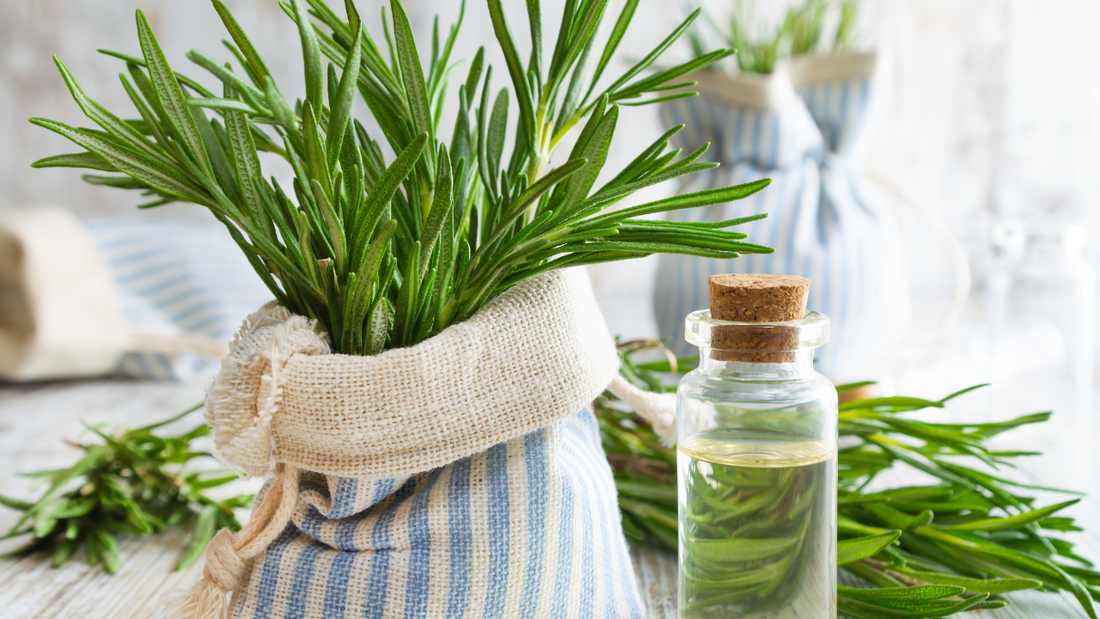
From Kitchen to Medicine Cabinet: The Many Benefits of Rosemary
Rosemary is more than just a fragrant herb that adds flavor to your favorite dishes. This evergreen shrub, native to the Mediterranean, has been cherished for centuries for its culinary, medicinal, and aromatic properties.
Whether you're looking to boost your health, enhance your meals, or create a refreshing home environment, rosemary has something to offer.
Let's explore the health benefits of rosemary and discover some typical uses for this versatile herb in your home.
Health Benefits of Rosemary
1. Rich in Antioxidants and Anti-Inflammatory Compounds
Rosemary contains powerful antioxidants, such as rosmarinic acid and carnosic acid, that help protect your body from oxidative stress and inflammation. These compounds combat free radicals, which can damage cells and contribute to chronic diseases like cancer and heart disease. Regular consumption of rosemary can help reduce inflammation and support overall health.
2. Improves Digestion
Rosemary has been traditionally used to support digestion and relieve gastrointestinal discomfort. It can stimulate the production of bile, which is essential for fat digestion, and reduce bloating and gas. Drinking rosemary tea after meals can be a soothing way to aid digestion and ease an upset stomach.
3. Enhances Memory and Concentration
The aroma of rosemary has been shown to improve cognitive function and memory. Studies suggest that inhaling rosemary essential oil can boost alertness, enhance concentration, and even improve mood. The herb contains compounds that may increase blood flow to the brain, providing more oxygen and nutrients to this vital organ.
4. Boosts Immune System
Rosemary’s antibacterial and antifungal properties make it a natural way to boost your immune system. Its essential oils can help fight off harmful bacteria and viruses, reducing the risk of infections. Incorporating rosemary into your diet or using it in home remedies can provide a natural defense against illnesses.
5. Supports Hair Health
Rosemary is a popular ingredient in hair care products due to its ability to stimulate hair growth and improve scalp health. It increases blood circulation in the scalp, which can promote hair growth and prevent hair loss. Additionally, rosemary's antimicrobial properties help combat dandruff and keep the scalp healthy.
6. Relieves Stress and Anxiety
The calming scent of rosemary can have a positive impact on your mental health. Aromatherapy with rosemary essential oil has been shown to reduce stress and anxiety levels. Incorporating rosemary into your self-care routine, whether through essential oils, teas, or baths, can help create a sense of relaxation and well-being.
Typical Uses of Rosemary in the Home
1. Culinary Uses
Rosemary is a staple in Mediterranean cuisine, adding a distinctive flavor to dishes. It pairs well with roasted meats, vegetables, and potatoes. You can use fresh or dried rosemary to season soups, stews, sauces, and marinades. A sprig of rosemary can also be added to olive oil or vinegar for a flavorful infusion.
2. Herbal Tea
Rosemary tea is a simple way to enjoy the herb's health benefits. To make rosemary tea, steep a teaspoon of dried rosemary leaves or a few sprigs of fresh rosemary in hot water for 5-10 minutes. Strain and enjoy the aromatic, slightly minty flavor. You can sweeten it with honey or add a slice of lemon for extra flavor.
3. Natural Air Freshener
Rosemary’s fresh, pine-like scent makes it an excellent natural air freshener. Place a few sprigs of rosemary in a bowl of distilled water, or simmer them on the stove with other herbs like thyme and sage. You can also make a rosemary-scented spray by combining rosemary essential oil with distilled water in a spray bottle, creating a refreshing and natural way to scent your home.
4. DIY Cleaning Products
Rosemary’s antibacterial properties make it a great addition to homemade cleaning products. Add a few drops of rosemary essential oil to a mixture of vinegar and distilled water to create a natural, effective cleaner for countertops, floors, and other surfaces. This solution not only cleans but also leaves your home smelling fresh.
5. Gardening and Pest Control
Rosemary can be grown in your garden or in pots on your windowsill. Its strong scent can help deter pests like mosquitoes, flies, and moths. Planting rosemary near other herbs and vegetables can help protect your garden from unwanted insects. Additionally, fresh rosemary can be cut and used to make sachets to place in closets and drawers as a natural moth repellent.
6. Aromatherapy
Using rosemary essential oil in a diffuser can fill your home with its invigorating scent. This can help improve mental clarity and focus, making it a great choice for workspaces or study areas. You can also add a few drops of rosemary oil to a bath for a relaxing, stress-relieving experience.
Tips for Growing Rosemary in Pots at Home
Growing rosemary at home is an excellent way to have a fresh supply of this beneficial herb year-round. Here are some tips to help you get started:
Choose the Right Pot
- Use a pot that is at least 12 inches in diameter to give the rosemary's roots enough space to grow.
- Ensure the pot has good drainage to prevent waterlogging, which can cause root rot.
Use Well-Draining Soil
- Rosemary thrives in well-draining soil. Use a sandy or loamy potting mix, or mix regular potting soil with sand or perlite.
- Avoid using heavy, clay-like soil that retains too much moisture.
Provide Plenty of Sunlight
-
Place the rosemary pot in a sunny location where it can receive at least 6-8 hours of sunlight daily.
-
A south-facing window is ideal if you are growing rosemary indoors.
Water Sparingly
- Rosemary prefers to stay on the drier side. Water the plant only when the top inch of soil feels dry to the touch.
- Avoid overwatering, as rosemary does not like to sit in soggy soil.
Prune Regularly
-
Prune rosemary regularly to encourage bushy growth and prevent the plant from becoming leggy.
-
Pinch back the tips of the stems to promote a fuller, more compact shape.
Bring Indoors in Cold Weather
-
Rosemary is sensitive to frost, so bring your potted rosemary indoors during the winter if you live in a cold climate.
-
Keep it in a bright spot and continue to water sparingly during the colder months.
Conclusion
Rosemary is a versatile herb that offers a wide range of health benefits and practical uses in the home. From enhancing your meals to promoting relaxation and supporting your immune system, rosemary can play a valuable role in your daily life. Growing rosemary in pots allows you to enjoy its benefits year-round, whether you're using it in your cooking, as a natural air freshener, or as a remedy for various ailments.
*Water is a common ingredient in many DIY products, but it's important to use it safely to prevent bacterial growth and contamination. If you're making homemade products like lotions, sprays, or cleaners, always use distilled or boiled water to reduce the risk of introducing harmful microorganisms. Additionally, be aware that water-based products have a shorter shelf life, so make them in small batches and store them in the refrigerator to extend their usability. For added safety, consider using preservatives designed for DIY formulations, especially for products that will be stored at room temperature.



